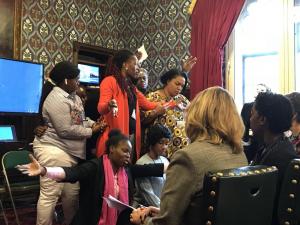You are here
- Home
- Organisations should engage marginalised communities in policy development
Organisations should engage marginalised communities in policy development
19 December 2017

A new policy briefing paper focused on improving the participation of marginalised communities in research, social policy development and implementation was launched at the House of Commons earlier this month.
The Participatory Arts and Social Action Research (PASAR) project explored the use of Participatory Action Research (PAR) for engaging marginalised groups in the development and application of social policy. PAR in this context is a collaborative approach that brings together policymakers, implementers and those members of society affected by these policies to share real life experiences and views related to the policy being developed. Research showed that this approach was effective in ensuring the voices of society are brought to the agenda and can be used to shape policy for the better. The research team recommends this approach be adopted by public institutions to protect the rights of marginalised groups, such as migrant families, and has developed a tool kit to help organisations and professionals working in this area to use PAR.
The PASAR project team worked with migrant families that have been designated NRPF (No Recourse to Public Funds). These families have been marginalised, and deeply affected by poverty and social isolation and are also more likely to experience homelessness or insecure accommodation, sometimes even economic or sexual exploitation, as a consequence of their vulnerable position. This group and other marginalised communities are often seen as unable to engage in dialogues about the way we live together and how we organise the everyday processes of living in society.
As well as recommending the use of PAR to engage these groups, the research team found that designating families at NRPF often led to destitution and strongly recommends that families with children should not be designated NRPF.
A summary of the research, findings and recommendations was launched at an event at the House of Commons sponsored by Kate Green MP and Chair of the APPG on Migration. Speakers included Baroness Ruth Lister, Citizenship and Civic Engagement Committee; Abi Brunswick, Project 17; Bethan Lant, Praxis; Omar Khan The Runnymede Trust, and Ros Edwards, Co-Director of the ESRC National Centre for Research Methods.
The event was attended by 50 participants, bringing together MPs, activists, academics, NGOS in the areas of human rights, women's rights, migration and anti-poverty to document and reflect on the challenges faced by migrant families who are affected by the No Recourse to Public Funds Policy, and therefore experience severe poverty, destitution and homelessness. Participants of the Participatory Arts and Social Action Research project, funded by Economic and Social Research Council/National Centre for Research Methods, showcased a short theatre play about their experiences in the workplace, social services departments and immigration control. This led to an engaged discussion among all attendees, where research participants shared their experiences and views of the policy.
The policy briefing can be found here, and draws on the Participatory Arts and Social Action Research (PASAR)’ project – a two-year research project, funded by the ESRC National Centre for Research Methods, and led by: Dr Umut Erel and Erene Kaptani, The Open University; Maggie O’Neill, University of York; Tracey Reynolds, University of Greenwich (2016-2017 https://www.ncrm.ac.uk/research/PASAR/).
Share this page:
Monthly Archive
- March 2024 (1)
- November 2023 (1)
- February 2023 (1)
- January 2023 (1)
- November 2022 (1)
- October 2022 (1)
Contact us
To find out more about our work, or to discuss a potential project, please contact:
International Development Research Office
Faculty of Arts and Social Sciences
The Open University
Walton Hall
Milton Keynes
MK7 6AA
United Kingdom
T: +44 (0)1908 858502
E: international-development-research@open.ac.uk
.jpg)